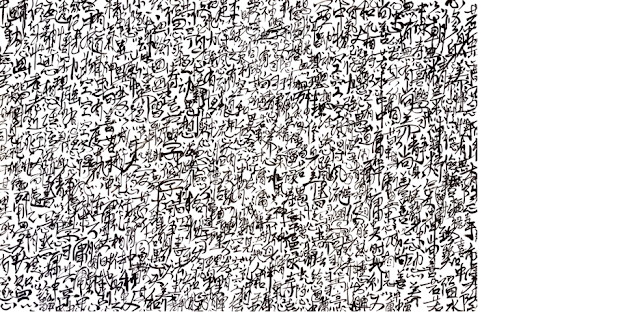Writing Beyond
 |
| Beyond Self. (2019) Chinese Ink on Rice Paper. Size: 140cm x 70cm, |
Writing Beyond the Self
The brush does not only write words; it spills the contents of a restless mind.
Look at the page — it is not neat order, not quiet transcription. It is a storm. Characters crowd one another, collide, overlap, insist on being seen. 無為, 常, 道, 樸 — not ideas, but mountains rising in ink. Around them, streams of smaller script flow like rivers, tributaries, endless commentary.
What drives such writing?
Not the polite hand of a copyist, nor the decorative calm of a court scribe. This is a psyche too full to contain. A mind intoxicated with philosophy, unwilling to reduce Dao to a single line. The brush becomes a release, a ritual, a meditation bordering on compulsion.
Here the artist is torn.
One side bows to discipline — Confucian legibility, classical quotations, vertical columns anchoring the chaos. The other side explodes in rebellion — Daoist paradox, Chan immediacy, wild strokes that fray and break into nothing. The psyche oscillates between control and surrender, like breath inhaled and exhaled.
The large characters are declarations: 無為 — do not force, act without acting. Yet the very act of writing reveals the paradox. The hand is forcing, overflowing, struggling with its own teaching. The artist is both believer and skeptic, sage and patient.
Psychologically, the field of ink is a confession:
-
A refusal to repress.
-
A need to saturate the page with every fragment of thought.
-
A desire to manifest philosophy not as doctrine but as lived turbulence.
There is joy in this chaos — the joy of dissolving boundaries. Order and disorder are not enemies; legibility and abstraction live together. The psyche delights in paradox: not-two, being born from non-being, the highest action in non-action. The brush becomes therapy, a way to reconcile opposites that thought alone cannot resolve.
And beneath it all, a longing:
To let go.
To arrive at wu wei not as a phrase but as a state of being.
To enact freedom by writing until writing collapses, until words blur into pure gesture, until philosophy turns to breath.
This is not calligraphy as ornament. It is calligraphy as psyche, as confession, as ritual. An artist influenced by Daoist sages, trained by Confucian tradition, pierced by Buddhist emptiness, and stirred by Western abstraction. The ink reveals it all: a self caught between worlds, breaking itself open on the page.


Comments
Post a Comment